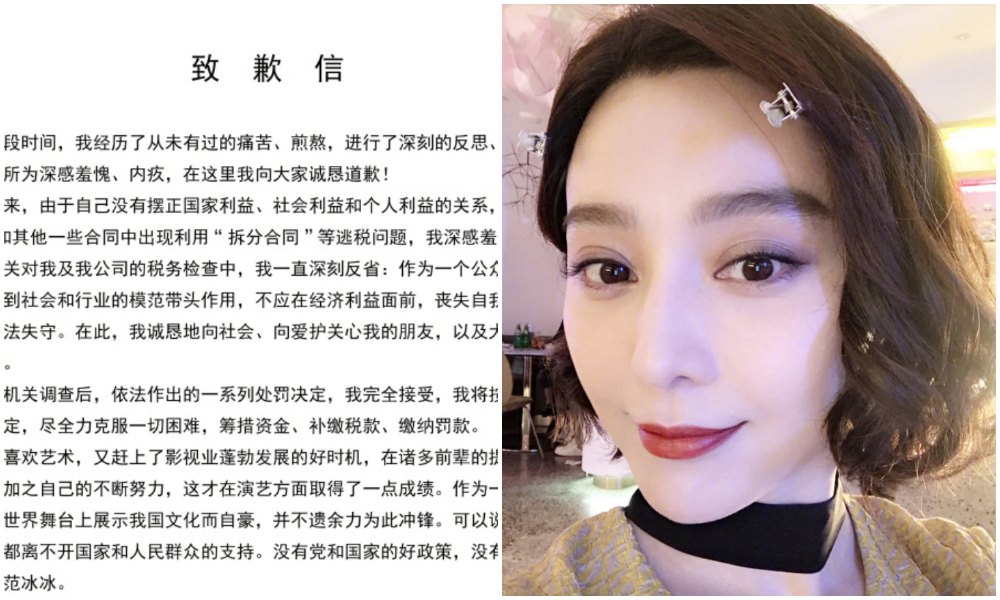China Arts & Entertainment
Fan Bing Bing is Back! The ‘Missing’ Actress is Ordered to Pay $130 Million & Apologizes on Weibo (Full Translation)
After months of silence, there is finally clarity about the situation of Fan Bing Bing: she is ordered to pay millions, and she is sorry.
Published
6 years agoon

First published
Chinese actress Fan Bing Bing, who has been “missing” for months since she was at the center of a tax evasion scandal, is back in the public eye. Hours after authorities issued the news that the actress has to pay millions in tax penalties, she returned to Weibo with an apology.
Fan Bing Bing (范冰冰), one of China’s most renowned actresses whose disappearance from the public eye has been at the center of a social media storm since July of this year, is back.
Earlier today, on October 3rd, news came out on Chinese state media that the tax investigations by authorities had been completed, with Xinhua News stating that the actress “has been ordered to pay taxes and fines worth hundreds of millions of yuan over tax evasion.”
Other sources said the actress had to pay 883 million yuan in tax fines; approximately 128,5 million US dollars. According to CGNT, the 37-year-old actress will not be held criminally liable if she pays the penalty in time.
The Tax Evasion Scandal
“What followed after the scandal was months of silence and rumors.”
Earlier this year, the news that Fan Bing Bing allegedly received a total payment of 60 million yuan ($9.3 million) for just four days work on the film Cell Phone 2, of which she would have only declared 10 million ($1.56 million) to authorities, became a huge trending topic on Chinese social media.
The tax scandal first came to light when Chinese TV host Cui Yongyuan (崔永元) leaked two different contracts on social media; the one that allegedly showed that the actress was paid a total of 10 million RMB for her work, with another showing a payment of 50 million RMB for the exact same work. These types of contracts are called yin-yang contracts (阴阳合同), an illegal practice to avoid paying taxes.
What followed after the scandal was months of silence and rumors. The actress was last seen in public on July 1st, and social media rumors alleged the actress might have left the country or that she was banned from acting.
Last month, one particularly strong rumor surfaced, saying that Fan had been arrested in Wuxi, in Jiangsu province, where Fan’s studio is based.
Hours after today’s news on her penalty came out, Fan issued an apology letter on Chinese social media site Weibo, in which she expressed shame about her actions. Fan has 62,6 million fans on her Weibo, and the apology letter is the first time she has posted on social media since June 2nd.
The Apology Letter
“Without the good policies of the Party and the state, without the love of the people, there would be no Fan Bing Bing.”
Full letter translation here in English (by What’s on Weibo):
Apology Letter
Over the past period, I have gone through unprecedented pain and suffering, and have done in-depth self-reflection and soul-searching. I feel deeply ashamed and guilty of everything I have done. Here, I want to express my sincere apologies to you.
For a long time, because of the fact that I did not correctly lay out the relations between the interests of the state, society, and myself, I used “split contracts” (拆分合同) for the film “Unbreakable Spirit” (大轰炸) and others, to evade the tax problem, and I am ashamed of that. These days, during the tax authorities’ tax inspections of me and my company, I have been deeply questioning myself the whole time: as public figures, we should abide by the law, and be a role model within the industry and society at large. We should not lose ourselves by putting economic interests first and loosening the supervision, which leads to breaking the law. Here, I sincerely apologize to society, to my cherished friends, to the public, and to the tax authorities.
After completing their investigation, the tax servation services have issued a series of penalties. I fully accept them and will try my best to overcome all difficulties and raise the funds and pay the taxes and fines in accordance with the tax authorities’ finalized penalty order.
I’ve loved arts since I was young, and because I was right on time for the booming developments within the film and TV industry, and thanks to the guidance of my seniors and loving support from the audience, along with my own continuous efforts, I have been able to acquire some achievements within the performing arts. As an actress, I am always proud of being able to showcase my culture in the international limelight, and I’ll do what I can to fight for that goal.
You could say that my every achievement is owed to my country and the support of its people. Without the good policies of the Party and the state, without the love and protection of the people, there would be no Fan Bing Bing.
Today, I feel very disquieted about my mistakes. I let down the country that educated me, the society that trusted me, and the fans who loved me. Here, again, I offer my sincerest apologies to everyone. Please forgive me!
I believe that, after going through this rectification, I emphasize rules, order, and responsibility. While offering everyone good work, I will also supervise the management of my company, engage in law-abiding business, keep my promises, and strive to have a company full of meaningful cultural content so I can bring out positive energy to the whole society!
Once again, to the society, to the fans who have always supported me, to the friends and family who care for me, I sincerely say sorry!
Fan Bingbing
October 3, 2018
On Weibo, Fan’s letter was soon shared more than 135,000 times (and ongoing), receiving ten thousands of likes.
The Criticism and Online Control
“Especially when looking at my own small salary, I have mixed feelings about all of this.”
The comments underneath the letter, however, were severely restricted – by Sina Weibo or by Fan herself-, and only displayed the six reactions of five different people who showed their support and sent their love to the actress.

Elsewhere on Weibo, however, there are more critical responses to the apology letter, with people wondering why the actress did not get any criminal charges for tax evasion, and also questioning the decision to let this story come out during the national holidays.
“From now on, all actors can do tax evasion, and just fix it once it’s discovered,” some netizens respond, writing: “Especially when looking at my own small salary, I have mixed feelings about all of this.”
Others are not too confident that there is still a brilliant future ahead for the actress, although one commenter writes: “It’s ok, if she’s no longer able to perform, she could still be an internet celebrity and do some commercials.”
The more supportive reactions include those saying: “She knows her mistakes and she will correct them, I believe she will only do better in the future.”
The strict control of information flows surrounding Fan’s apology is also attracting attention on social media, with some wondering why the topic is not showing up on the ‘hot search’ or ‘trending’ lists, although it obviously is a big trending topic. “May I ask why such a topic that is all over CCTV is not on Weibo’s trending lists,” one Weibo user asked: “Has Weibo been bribed or something?”
The State Media
“Those film and television companies and related employees who investigate themselves and correct any [open] tax payments before December 31st, can avoid any potential administrative penalties and fines..”
Xinhua News Agency issued an article on Weibo following today’s news, saying that “the case of Fan Bing Bing is a lesson for those in the film and tv industry to obey the law” (范冰冰案教育警示文艺影视从业者遵纪守法).
The article, by authors Bai Ying (白瀛) and Luo Sha (罗沙), was soon read more than 400,000 times.
It called Fan’s case the “biggest yet” when it comes to personal tax evasion in China, and also stated it played a strong role in being an “educational warning” for similar tax violating behavior of others.
Xinhua states that according to Chinese law, people who make false tax returns or evade tax payments for an amount that is more than 10% of the payable tax, can be sentenced to up to three years in prison, along with receiving payable penalties. If that amount is more than 30% of the payable tax, they can be sentenced to a maximum of seven years (and a minimum of three years) in prison.
But the law also states that people can prevent going to prison (or being “held criminally liable”), if they pay their tax payments and the full penalties tax payment within a proposed time frame. They can still be sentenced if they get another administrative penalty.
The state media article, noteworthy enough, further reveals that the State Administration of Taxation (国家税务总局) will carry out “special actions to regulate the tax orders within the film and television industry”: those film and television companies and related employees who investigate themselves and correct any [open] tax payments before December 31 of this year, can avoid any potential administrative penalties and fines (see screenshot of segment below).
In other words; this might suggest that there are many other (albeit much smaller) Fan Bing Bing cases out there, and that those involved are now getting the chance to correct themselves in the coming three months to avoid the fines and penalties that Fan does need to pay; meaning that the renowned actress and her tax scandal is used a ‘killing the chicken to scare the monkeys’ (杀鸡吓猴) case, as the Chinese saying goes: punishing an individual to set an example to others.
On Weibo, a typical comment says that the way in which this entertainment industry case was handled “is not really fair to ordinary people,” with many saying: “If you do not have the money or the fame [like Fan Bing Bing], you would be treated as a criminal for much smaller issues.”
By Manya Koetse and Miranda Barnes
Follow @whatsonweibo
Full letter here in Chinese
致歉信
最近一段时间,我经历了从未有过的痛苦、煎熬,进行了深刻的反思、反省,我对自己的所作所为深感羞愧、内疚,在这里我向大家诚恳道歉!
长期以来,由于自己没有摆正国家利益、社会利益和个人利益的关系,在影片《大轰炸》和其他一些合同中出现利用“拆分合同”等逃税问题,我深感羞愧。这些天在配合税务机关对我及我公司的税务检查中,我一直深刻反省:作为一个公众人物,应该遵纪守法,起到社会和行业的模范带头作用,不应在经济利益面前,丧失自我约束,放松管理,以致违法失守。在此,我诚恳地向社会、向爱护关心我的朋友,以及大众,向国家税务机关道歉。
对税务机关调查后,依法作出的一系列处罚决定,我完全接受,我将按照税务部门的最终处罚决定,尽全力克服一切困难,筹措资金、补缴税款、缴纳罚款。
我从小喜欢艺术,又赶上了影视业蓬勃发展的好时机,在诸多前辈的提携和观众朋友的爱护下,加之自己的不断努力,这才在演艺方面取得了一点成绩。作为一个演员,我常为自己能在世界舞台上展示我国文化而自豪,并不遗余力为此冲锋。可以说,我每一点成绩的取得,都离不开国家和人民群众的支持。没有党和国家的好政策,没有人民群众的爱护,就没有范冰冰。
今天,我对自己的过错深感惶恐不安!我辜负了国家对我的培养,辜负了社会对我的信任,也辜负了影迷对我的喜爱!在此,我再次向大家诚恳道歉!请大家原谅!
我相信,经过这次整顿,我会讲规矩、遵秩序、重责任,在把好的作品献给大家的同时,也要监督公司管理,守法经营,诚实守信,争做富有文化内涵的好公司,为全社会传播正能量!
再次向社会,向一直支持我的影迷,向关爱我的朋友家人,真诚的说一句,对不起!
范冰冰
2018年10月3日
Spotted a mistake or want to add something? Please let us know in comments below or email us.
©2018 Whatsonweibo. All rights reserved. Do not reproduce our content without permission – you can contact us at info@whatsonweibo.com
Stories that are authored by the What's on Weibo Team are the stories that multiple authors contributed to. Please check the names at the end of the articles to see who the authors are.

China Memes & Viral
Chengdu Disney: The Quirkiest Hotspot in China
How a senior activity park in Chengdu was ‘Disneyfied’ and became a viral hotspot.
Published
6 days agoon
April 12, 2024
How did a common park turn into a buzzing hotspot? By mixing online trends with real-life fun, blending foreign styles with local charm, and adding a dash of humor and absurdity, Chengdu now boasts its very own ‘Chengdu Disney’. We explain the trend.
– By Manya Koetse, co-authored by Ruixin Zhang
Have you heard about Chengdu Disney yet? If not, it’s probably unlike anything you’d imagine. It’s not actually a Disney theme park opening up in Chengdu, but it’s one of the city’s most viral hotspots these days.
What is now known as ‘Chengdu Disney’ all over the Chinese internet is actually a small outdoor park in a residential area in Chengdu’s Yulin area, which also serves as the local senior fitness activity center.
Crowds of young people are coming to this area to take photos and videos, hang out, sing songs, cosplay, and be part of China’s internet culture in an offline setting.
Once Upon a Rap Talent Show
The roots of ‘Chengdu Disney’ can be traced back to the Chinese hip-hop talent show The Rap of China (中国新说唱), where a performer named Nuomi (诺米), also known as Lodmemo, was eliminated by Chinese rapper Boss Shady (谢帝 Xièdì), one of the judges on the show.
Nuomi felt upset about the elimination and a comment made by his idol mentor, who mistakenly referred to a song Nuomi made for his ‘grandma’ instead of his grandfather. His frustration led to a viral livestream where he expressed his anger towards his participation in The Rap of China and Boss Shady.
However, it wasn’t only his anger that caught attention; it was his exaggerated way of speaking and mannerisms. Nuomi, with his Sichuan accent, repeatedly inserted English phrases like “y’know what I’m saying” and gestured as if throwing punches.
His oversized silver chain, sagging pants, and urban streetwear only reinforce the idea that Nuomi is trying a bit too hard to emulate the fashion style of American rappers from the early 2000s, complete with swagger and street credibility.

Lodmemo emulates the style of American rappers in the early 2000s, and he has made it his brand.
Although people mocked him for his wannabe ‘gangsta’ style, Nuomi embraced the teasing and turned it into an opportunity for fame.
He decided to create a diss track titled Xiè Tiān Xièdì 谢天谢帝, “Thank Heaven, Thank Emperor,” a word joke on Boss Shady’s name, which sounds like “Shady” but literally means ‘Thank the Emperor’ in Chinese. A diss track is a hip hop or rap song intended to mock someone else, usually a fellow musician.
In the song, when Nuomi disses Boss Shady (谢帝 Xièdì), he raps in Sichuan accent: “Xièdì Xièdì wǒ yào diss nǐ [谢帝谢帝我要diss你].” The last two words, namely “diss nǐ” actually means “to diss you” but sounds exactly like the Chinese word for ‘Disney’: Díshìní (迪士尼). This was soon picked up by netizens, who found humor in the similarity; it sounded as if the ‘tough’ rapper Nuomi was singing about wanting to go to Disney.

Nuomi and his diss track, from the music video.
Nuomi filmed the music video for this diss track at a senior activity park in Chengdu’s Yulin subdistrict. The music video went viral in late March, and led to the park being nicknamed the ‘Chengdu Disney.’
The particular exercise machine on which Nuomi performed his rap quickly became an iconic landmark on Douyin, as everyone eagerly sought to visit, sit on the same see-saw-style exercise machine, and repeat the phrase, mimicking the viral video.

What began as a homonym led to people ‘Disneyfying’ the park itself, with crowds of visitors flocking to the park, some dressed in Disney-related costumes.

This further developed the concept of a Chengdu ‘Disney’ destination, turning the park playground into the happiest place in Yulin.
Chengdu: China’s Most Relaxed Hip Hop Hotspot
Chengdu holds a special place in China’s underground hip-hop scene, thanks to its vibrant music culture and the presence of many renowned Chinese hip-hop artists who incorporate the Sichuan dialect into their songs and raps.
This is one reason why this ‘Disney’ meme happened in Chengdu and not in any other Chinese city. But beyond its musical significance, the playful spirit of the meme also aligns with Chengdu’s reputation for being an incredibly laid-back city.
In recent years, the pursuit of a certain “relaxed feeling” (sōngchígǎn 松弛感) has gained popularity across the Chinese internet. Sōngchígǎn is a combination of the word for “relaxed,” “loose” or “lax” (松弛) and the word for “feeling” (感). Initially used to describe a particular female aesthetic, the term evolved to represent a lifestyle where individuals strive to maintain a relaxed demeanor, especially in the face of stressful situations.
🌟 Attention!
For 11 years, What’s on Weibo has remained a 100% independent blog, fueled by my passion to write about China’s digital culture and online trends. Over a year ago, we introduced a soft paywall to ensure the sustainability of this platform. I’m grateful to all our loyal readers who’ve subscribed since 2022. Your support has been invaluable. But we need more subscribers to continue our work. If you appreciate our content and want to support independent China reporting, please consider becoming a subscriber. Your support keeps What’s on Weibo going strong!
The concept gained traction online in mid-2022 when a Weibo user shared a story of a family remaining composed when their travel plans were unexpectedly disrupted due to passport issues. Their calm and collected response inspired the adoption of the “relaxed feeling” term (also read here).
Central to embodying this sense of relaxation is being unfazed by others’ opinions and avoiding unnecessary stress or haste out of fear of judgment.
Nowadays, Chinese cities aim to foster this sense of sōngchígǎn. Not too long ago, there were many hot topics suggesting that Chengdu is the most sōngchí 松弛, the most relaxed city in China.
This sentiment is reflected in the ‘Chengdu Disney’ trend, which both pokes fun at a certain hip-hop aesthetic deemed overly relaxed—like the guys who showed up with sagging pants—and embraces a carefree, childlike silliness that resonates with the city’s character and its people.

Mocking sagging pants at ‘Chengdu Disney.’
Despite the influx of visitors to the Chengdu Disney area, authorities have not yet significantly intervened. Community notices urging respect for nearby residents and the presence of police officers to maintain order indicate a relatively hands-off approach. For now, it seems most people are simply enjoying the relaxed atmosphere.
Being Part of the Meme
An important aspect that contributes to the appeal of Chengdu Disney is its nature as an online meme, allowing people to actively participate in it.

Scenes from Chengdu Disney, images via Weibo.
China has a very strong meme culture. Although there are all kinds of memes, from visual to verbal, many Chinese memes incorporate wordplay. In part, this has to do with the nature of Chinese language, as it offers various opportunities for puns, homophones, and linguistic creativity thanks to its tones and characters.
The use of homophones on Chinese social media is as old as Chinese social media itself. One of the most famous examples is the phrase ‘cǎo ní mǎ’ (草泥马), which literally means ‘grass mud horse’, but is pronounced in the same way as the vulgar “f*ck your mother” (which is written with three different characters).
In the case of the Chengdu Disney trend, it combines a verbal meme—stemming from the ‘diss nǐ’ / Díshìní homophone—and a visual meme, where people gather to pose for videos/photos in the same location, repeating the same phrase.
Moreover, the trend bridges the gap between the online and offline worlds, as people come together at the Chengdu playground, forming a tangible community through digital culture.
The fact that this is happening at a residential exercise park for the elderly adds to the humor: it’s a Chengdu take on what “urban” truly means. These colorful exercise machines are a common sight in Chinese parks nationwide and are actually very mundane. Transforming something so normal into something extraordinary is part of the meme.

A 3D-printed model version of the exercise equipment featured in Nuomi’s music video.
Lastly, the incorporation of the Disney element adds a touch of whimsy to the trend. By introducing characters like Snow White and Mickey Mouse, the trend blends American influences (hip-hop, Disney) with local Chengdu culture, creating a captivating and absurd backdrop for a viral phenomenon.
For some people, the pace in which these trends develop is just too quick. On Weibo, one popular tourism blogger (@吴必虎) wrote: “The viral hotspots are truly unpredictable these days. We’re still seeing buzz around the spicy hot pot in Gansu’s Tianshui, meanwhile, a small seesaw originally meant for the elderly in a residential community suddenly turns into “Chengdu Disneyland,” catching the cultural and tourism authorities of Sichuan and even Shanghai Disneyland off guard. Netizens are truly powerful, even making it difficult for me, as a professional cultural tourism researcher, to keep up with them.”
By Manya Koetse, co-authored by Ruixin Zhang
Independently reporting China trends for over a decade. Like what we do? Support us and get the story behind the hashtag by subscribing:
Spotted a mistake or want to add something? Please let us know in comments below or email us. First-time commenters, please be patient – we will have to manually approve your comment before it appears.
©2024 Whatsonweibo. All rights reserved. Do not reproduce our content without permission – you can contact us at info@whatsonweibo.com.
China Music
The Chinese Viral TikTok Song Explained (No, It’s Not About Samsung)
The viral Chinese ‘Samsung’ Tiktok song is also not about cheating or getting back with your ex.
Published
3 weeks agoon
March 31, 2024
Over the past few days, a Chinese song ‘challenge’ has been going viral on TikTok, with various TikTokers from America and beyond mastering the phonetics of a Mandarin song, lip-syncing it and delivering their own dramatic performance.
TikTok user Ajibola Olalekan posted the popular part of the song on March 16, receiving over 71k likes within two weeks, with various TikTokers using the sound for their own videos, some receiving millions of views (watch).
There's this TikTok challenge where people are pouring their hearts into mastering the phonetics of this Chinese song and delivering a dramatic performance. pic.twitter.com/AkVepxec8m
— Manya Koetse (@manyapan) March 31, 2024
TikTok creator Emily, also known as Maverickmother, lip-synced the song from her car, writing: “Admit to your husband you were wrong and apologize or sing in Chinese..”

The popular video maker Azz (@theofficial_azz) also posted a video of himself singing the song, writing: “Admit you were wrong or sing in Chinese.”

TV host and content creator Mark Odea took things a bit further and put on a dramatic performance of himself lip-syncing the song, writing: “I didn’t realize this song was in English.” According to his interpretation of the song, the lyrics go like this:
“Woman cheat
So true in shit sun sun
Would you lie? you shout It’s over Ya
But you are now women itchy
Loud loud itchy ya
Woman cheat send some d
Ching eat chang”
While some think the song is about cheating or getting back with your ex, others also refer to this song as the “Chinese Samsung song,” because they believe the singer is singing about ‘Samsung.’ It’s actually the word cāngsāng (沧桑) they’re hearing, meaning ‘great changes’ or ‘ups and downs.’
The Chinese song in question is “This Life’s Fate” (今生缘) by the Beijing-born singer Chuan Zi (川子, real name Jiang Yachuan 姜亚川, born in 1969). Released in 2009, it is one of his most famous songs, which is about life and friendship.
The part of the song that has recently gone viral on TikTok is as follows:
我们今生注定是沧桑
Wǒmen jīnshēng zhùdìng shì cāngsāng
哭着来要笑着走过呀
Kūzhe lái yào xiàozhe zǒuguò ya
朋友啊让我们一起牢牢铭记呀
Péngyǒu a ràng wǒmen yìqǐ láo láo míngjì ya
我们今生兄弟情谊长
Wǒmen jīnshēng xiōngdì qíngyì cháng
“Our lives are destined to be full of change
We cried when we came [into this world], let’s leave with a smile
My friend, let’s remember very well
We’ll always be like brothers in this life”
By now, the Tiktok trend of foreigners pouring their hearts into mastering a song they may not even understand has also attracted attention on Chinese social media, where many netizens are enjoying the spectacle.
“The feelings of a ‘straight guy’ are just universal,” one top commenter writes (the word used is ‘Zhinan’ 直男, originally referring to heterosexual males, but then came to refer to an entire category of men in China).
“They may not get the exact meaning of the song, but the emotion is there,” others say.
The song, filled with nostalgia, contemplates life and death, emphasizing our shared journey and finding solace in companionship.
If you want to master the entire song yourself, here are the full lyrics (see full song here):
我们今生有缘在路上
Wǒmen jīnshēng yǒu yuán zài lùshàng
In this life, we are destined to be on this journey
只要我们彼此永不忘
Zhǐyào wǒmen bǐcǐ yǒng bù wàng
If only we never forget each other
朋友啊,让我们一起牢牢铭记呀
Péngyǒu a, ràng wǒmen yīqǐ láoláo míngjì ya
My friend, let’s remember very well
别在乎那一些忧和伤
Bié zàihu, nà yīxiē yōu hé shāng
Don’t mind about all that worry and pain
我们今生注定是沧桑
Wǒmen jīnshēng zhùdìng shì cāngsāng
Our lives are destined to be full of change
哭着来要笑着走过呀
Kūzhe lái yào xiàozhe zǒuguò ya
We cried when we came [into this world], let’s leave with a smile
朋友啊,让我们一起牢牢铭记呀
Péngyǒu a, ràng wǒmen yīqǐ láoláo míngjì ya.
My friend, let’s remember very well
我们今生兄弟情谊长
Wǒmen jīnshēng xiōngdì qíngyì cháng
We’ll always be like brothers in this life
朋友啊,让我们一起牢牢铭记呀
Péngyǒu a, ràng wǒmen yīqǐ láoláo míngjì ya
My friend, let’s remember very well
我们今生有缘在路上
Wǒmen jīnshēng yǒu yuán zài lùshàng
In this life, we are destined to be on this journey
只要我们彼此永不忘
Zhǐyào wǒmen bǐcǐ yǒng bù wàng
As long as we never forget each other.
朋友啊,让我们一起牢牢铭记呀
Péngyǒu a, ràng wǒmen yīqǐ láoláo míngjì ya
My friend, let’s remember very well
别在乎,那一些忧和伤
Bié zàihu, nà yīxiē yōu hé shāng
Don’t mind about all that worry and pain
我们今生就像梦一场
Wǒmen jīnshēng jiù xiàng mèng yī chǎng
This life is like a dream.
有你陪喝醉了又何妨
Yǒu nǐ péi hēzuì le yòu héfáng
What’s the harm in getting drunk together with you
朋友啊,让我们一起牢牢铭记呀
Péngyǒu a, ràng wǒmen yīqǐ láoláo míngjì ya
My friend, let’s remember it very well
凡尘过后终了无牵挂
Fánchén guòhòu zhōngle wú qiānguà.
After this mundane life, there will be no worries
朋友啊,让我们一起牢牢铭记呀
Péngyǒu a, ràng wǒmen yīqǐ láoláo míngjì ya.
My friend, let’s remember it very well
By Manya Koetse
Independently reporting China trends for over a decade. Like what we do? Support us and get the story behind the hashtag by subscribing:
Spotted a mistake or want to add something? Please let us know in comments below or email us. First-time commenters, please be patient – we will have to manually approve your comment before it appears.
©2024 Whatsonweibo. All rights reserved. Do not reproduce our content without permission – you can contact us at info@whatsonweibo.com.
Subscribe

Chengdu Disney: The Quirkiest Hotspot in China

Where to Eat and Drink in Beijing: Yellen’s Picks

Weibo Watch: Burning BMWs

More than Malatang: Tianshui’s Recipe for Success

The Chinese Viral TikTok Song Explained (No, It’s Not About Samsung)

The ‘Two Sessions’ Suggestions: Six Proposals Raising Online Discussions

A Snowball Effect: How Cold Harbin Became the Hottest Place in China

Jia Ling Returns to the Limelight with New “YOLO” Movie and 110-Pound Weight Loss Announcement

Top 9 Chinese Movies to Watch This Spring Festival Holiday

Party Slogan, Weibo Hashtag: “The Next China Will Still Be China”

From Pitch to Politics: About the Messy Messi Affair in Hong Kong (Updated)

Weibo Watch: Frogs in Wells

Looking Back on the 2024 CMG Spring Festival Gala: Highs, Lows, and Noteworthy Moments

Two Years After MU5735 Crash: New Report Finds “Nothing Abnormal” Surrounding Deadly Nose Dive

More than Malatang: Tianshui’s Recipe for Success
Get in touch
Would you like to become a contributor, or do you have any tips or suggestions? Get in touch here!
Popular Reads
-

 China Insight1 month ago
China Insight1 month agoThe ‘Two Sessions’ Suggestions: Six Proposals Raising Online Discussions
-

 China Insight3 months ago
China Insight3 months agoA Snowball Effect: How Cold Harbin Became the Hottest Place in China
-

 China Arts & Entertainment3 months ago
China Arts & Entertainment3 months agoJia Ling Returns to the Limelight with New “YOLO” Movie and 110-Pound Weight Loss Announcement
-

 China Arts & Entertainment2 months ago
China Arts & Entertainment2 months agoTop 9 Chinese Movies to Watch This Spring Festival Holiday






awrrw
October 6, 2018 at 4:29 pm
That`s how China does business, corruption to the max